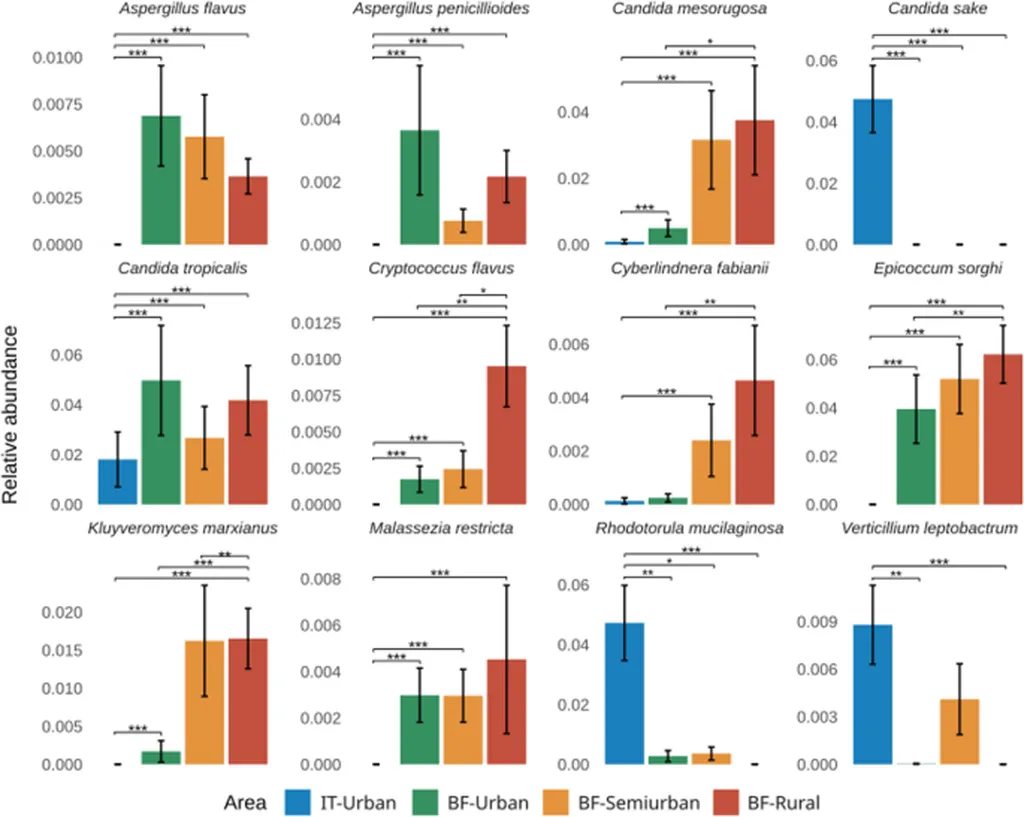In the bustling capital of Burkina Faso, Ouagadougou, a silent transformation is taking place—not in the city’s infrastructure, but in the gut microbiomes of its residents. A recent study published in the journal *BMC Microbiology* (which translates to “German Medical Journal of Microbiology”) sheds light on how urbanization and dietary shifts are altering the fungal communities in our guts, with potential implications for human health and even the energy sector.
Led by Sonia Renzi from the Department of Biology at the University of Florence, the research team investigated the gut mycobiota— the fungal component of the gut microbiota—of individuals from rural, semi-urban, and urban settings in Burkina Faso. They compared these findings with a cohort of Italian families, representing a Western urban lifestyle.
The study revealed a stark contrast in gut fungal diversity between rural and urban dwellers. “We observed a significant reduction in the alpha-diversity of the gut mycobiota in urban settings compared to rural areas,” Renzi explained. This means that as people move from rural to urban environments, the variety of fungi in their guts decreases.
The researchers identified 33 fungal amplicon sequence variants (ASVs) significantly associated with different lifestyles and dietary patterns. This finding underscores the profound impact of urbanization on gut mycobiota composition.
So, why should this matter to the energy sector? The gut microbiome, including its fungal component, plays a crucial role in human health and metabolism. Changes in gut mycobiota could influence energy metabolism, potentially affecting the overall energy balance in populations. Understanding these changes could lead to targeted interventions that promote healthier lifestyles, reducing the burden of lifestyle-related diseases and potentially lowering healthcare costs.
Moreover, the study’s findings could inspire innovations in food technology and nutrition. As urbanization continues to rise globally, there is a growing need for food products that support gut health. Companies investing in research and development of such products could tap into a burgeoning market.
The research also highlights the importance of preserving traditional diets and lifestyles, which may harbor a richer fungal diversity. “The loss of fungal diversity associated with a rural lifestyle is a potential indicator of the shift from a rural to an urban context,” Renzi noted. This loss could have implications for human health, echoing the hygiene hypothesis, which suggests that reduced exposure to microorganisms in urban environments may contribute to increased susceptibility to certain diseases.
As urbanization continues to reshape our world, understanding its impact on gut mycobiota becomes increasingly important. This study lays the groundwork for further research into the health implications of these microbial changes, paving the way for innovative solutions in healthcare, nutrition, and even the energy sector.
In the words of Renzi, “These findings lay the foundation for further studies aiming at investigating the effect that these microbial losses will have on human health.” The journey to uncover the full extent of these impacts has just begun, and the insights gained could reshape our approach to health and well-being in an increasingly urbanized world.

